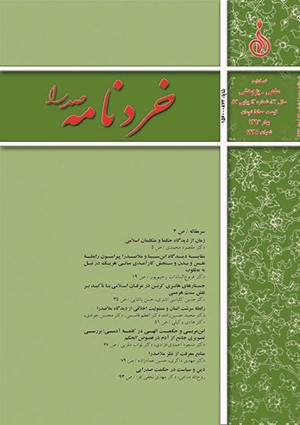رابطة سرشت انسان و مسئوليت اخلاقي از ديدگاه ملاصدرا
محورهای موضوعی :
محمد حسينزاده
1
![]() ,
اعظم قاسمي
2
,
محسن جوادي
3
,
هادي وكيلي
4
,
اعظم قاسمي
2
,
محسن جوادي
3
,
هادي وكيلي
4
1 - مؤسسه پژوهشي حكمت و فلسفة ايران
2 - پژوهشگاه علوم انساني و مطالعات فرهنگي
3 - دانشگاه قم
4 - پژوهشگاه علوم انساني و مطالعات فرهنگي
کلید واژه: سرشت انسان مسئوليت اخلاقي حدوث جسماني نفس امكان بديل نظام تكليف و جزا ملاصدرا ,
چکیده مقاله :
قواعد حكمت متعاليه و همچنين مشاهدات تجربي بيان ميكنند كه انسانها در سرشت اوليه با يكديگر متفاوتند و همين، سبب تفاوت در ارادهها و افعال ارادي انسانها ميشود. اين مقاله به بررسي ديدگاه ملاصدرا دربارة تأثير سرشت انسان بر افعال اختياري ميپردازد و نقش سرشت انسان را در مسئوليتپذيري بررسي ميكند. شكلگيري سرشت انسان در فلسفة ملاصدرا با مكاتب فلسفي ديگر متفاوت است؛ در حكمت متعاليه، سرشت انسان برآمده از حيثيت مادي نفس ميباشد و اختلاف سرشت انسانها، از اختلاف مواد جسماني نشئت ميگيرد. ضميمه شدن اين امر به رابطة ضروري علت و معلول موجب شده تا مسئوليت اخلاقي در فلسفة او قابل تبيين نباشد. اين مسئله، حكمت عملي صدرايي را با چالشهايي روبرو ميكند كه مهمترين آنها، چالش در تبيين نظام تكليف و جزاست.
The principles of the Transcendent Philosophy as well as empirical observations indicate that people are different from each other in their primary nature. This explains why they are different in terms of their free will and voluntary acts. The present paper investigates Mulla Sadra’s view of the effects of human nature on their voluntary acts and examines its role in accepting responsibility. The formation of human nature in Mulla Sadra’s philosophy is different from that in other schools of philosophy. In the Transcendent Philosophy, the human nature originates in the material mode of the soul, and the differences among the natures of different human beings are rooted in the differences among corporeal substances. The attachment of this affair to the necessity of the cause-effect relation is the reason why moral responsibility is not explainable in Mulla Sadra’s philosophy. This problem poses certain challenges to Sadrian practical wisdom, the most important of which is the challenge of explaining the system of duty and recompense.
